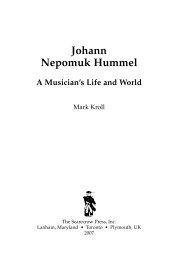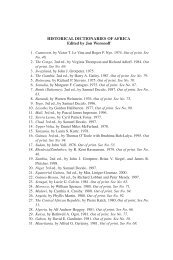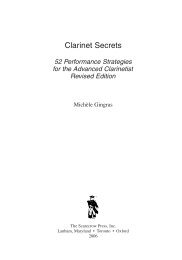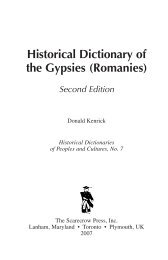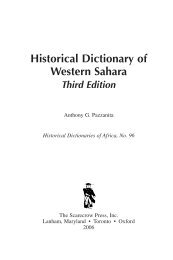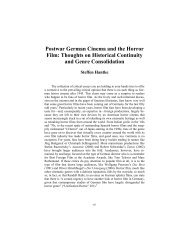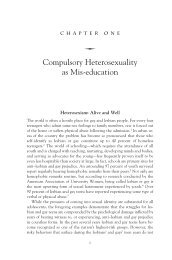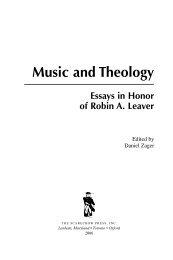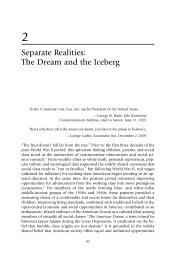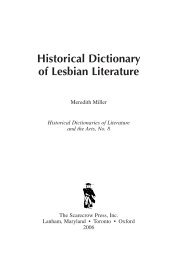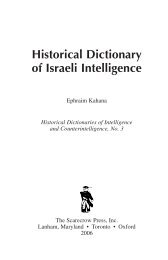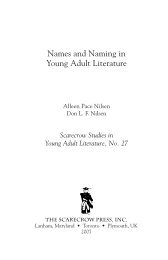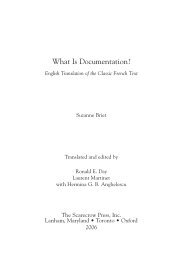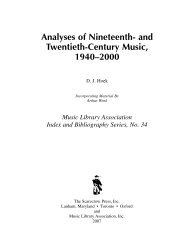Founded by Friends : the Quaker heritage of fifteen - Scarecrow Press
Founded by Friends : the Quaker heritage of fifteen - Scarecrow Press
Founded by Friends : the Quaker heritage of fifteen - Scarecrow Press
Create successful ePaper yourself
Turn your PDF publications into a flip-book with our unique Google optimized e-Paper software.
Guilford College 23<br />
Jeremiah Hubbard, teacher and member <strong>of</strong> New Garden Monthly<br />
Meeting, was <strong>the</strong> clerk <strong>of</strong> North Carolina Yearly Meeting from 1830 to<br />
1835. He was a highly respected minister and educator among North Carolina<br />
<strong>Friends</strong> and a crucial player in <strong>the</strong> early establishment <strong>of</strong> <strong>the</strong> school.<br />
His position in <strong>the</strong> New Garden community and <strong>the</strong> presence <strong>of</strong> his<br />
monthly meeting school <strong>the</strong>re is credited with influencing <strong>the</strong> placement<br />
<strong>of</strong> <strong>the</strong> school at New Garden. However, like so many <strong>Friends</strong>, Hubbard<br />
left for Indiana before <strong>the</strong> actual opening <strong>of</strong> <strong>the</strong> school in 1837. He continued<br />
to support <strong>the</strong> effort from a distance and came back to New Garden<br />
to attend yearly meeting sessions following <strong>the</strong> opening <strong>of</strong> <strong>the</strong> school.<br />
Nathan Hunt, born in Guilford County in 1758 and patriarch <strong>of</strong><br />
nineteenth-century North Carolina <strong>Quaker</strong>ism, introduced <strong>the</strong> subject <strong>of</strong><br />
education at <strong>the</strong> 1830 yearly meeting and continued to press for <strong>the</strong> formation<br />
<strong>of</strong> a yearly meeting school. He presented his vision for a school<br />
both to <strong>Friends</strong> in North Carolina Yearly Meeting and among <strong>the</strong> wider<br />
world <strong>of</strong> <strong>Friends</strong>. Before <strong>the</strong> 1831 yearly meeting sessions, Hunt had traveled<br />
among <strong>Friends</strong> in <strong>the</strong> North and believed <strong>the</strong>y would provide<br />
needed assistance. Through his efforts, he was able to raise <strong>the</strong> substantial<br />
funds necessary for <strong>the</strong> opening. Although he did not serve on <strong>the</strong> early<br />
boarding school committees, his sons-in-law—Dougan Clark and Joshua<br />
Stanley—were <strong>of</strong>ficially involved in <strong>the</strong> founding and later served, with<br />
Hunt’s daughters, as superintendents <strong>of</strong> <strong>the</strong> school.<br />
It would take several years for <strong>the</strong> plan to develop into an actual school,<br />
and committees were established to determine <strong>the</strong> details. Originally, a<br />
group <strong>of</strong> forty-five was chosen to implement <strong>the</strong> plan and deliver its report<br />
at <strong>the</strong> 1832 yearly meeting sessions. A smaller committee made up <strong>of</strong><br />
eight men and eight women was <strong>the</strong>n appointed to choose a location. Before<br />
<strong>the</strong> purchase <strong>of</strong> land at New Garden, <strong>the</strong> charter was drafted, and<br />
trustees were appointed.<br />
EARLY OVERSIGHT AND ORTHODOX QUAKER INFLUENCE<br />
The original charter placed all power in <strong>the</strong> hands <strong>of</strong> twelve men: Joshua<br />
Stanley, John Beard, Thomas Hodgin, John Russell, Elisha C<strong>of</strong>fin, Henry<br />
Macy, Zacharias C<strong>of</strong>fin, Thomas T. Hunt, Jeremiah Pickett, Nixon Henley,<br />
Peter Dicks, and Phineas Nixon Jr. There was no mention <strong>of</strong> <strong>the</strong> yearly<br />
meeting or restrictions on <strong>the</strong> makeup <strong>of</strong> <strong>the</strong> trustees. Originally, a committee<br />
<strong>of</strong> women <strong>Friends</strong> was appointed in equal number to oversee <strong>the</strong><br />
school, but women members were not prominent in <strong>the</strong> business <strong>of</strong> <strong>the</strong><br />
trustees and, though <strong>the</strong>y met with <strong>the</strong> board until 1869, were only noted<br />
as present and never listed. Women did not formally serve on <strong>the</strong> board<br />
until Mary Petty was appointed in 1937.



